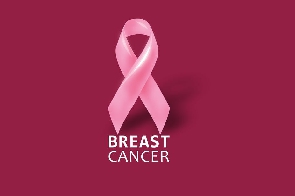Madam Wonder Andrea Yayra Amenuvor, Oncology Nurse Specialist and a Certified Breast Health Educator, Ho Polyclinic, has said tobacco and alcohol consumption increases a woman’s risk of developing breast cancer.
She said every single stick of cigarette smoked contained over 200 carcinogens made up of nicotine, rendering it dangerous to one’s health and females who smoked and drank simultaneously were also at risk of other cancers.
Madam Amenuvor in an interview with the Ghana News Agency (GNA) after a sensitisation programme on breast cancer awareness held at the St Francis College of Education (FRANCO), Hohoe, disclosed that tobacco intake whether directly or through toffees and other consumables, remained dangerous to human health.
She explained that the ethanol in alcohol which made one feel tipsy or boozed also contained carcinogens therefore “the more alcohol you have and the longer you drink increases your risk of developing breast cancer.”
Madam Amenuvor said the effect of alcohol and tobacco on the female body varied from that of the body due to the higher percentage of oestrogens produced for the effective growth and maturity of the reproductive organs, therefore excessive ingestion of nicotine may induce cancers.
She therefore advised females to desist from indulging in alcoholism and excessive smoking or becoming secondhand smokers by inhaling tobacco fumes from others.
Madam Amenuvor said although chemicals used for breast enlargement put women at risk of breast cancer it had not been clinically proven, and no research had shown that body tattoos could cause any type of cancer.
She said breastfeeding children offered more protection against breast cancer unlike men ‘sucking the breasts’ and aside from the pleasure derived from the act, the process had helped females identify lumps.
Madam Amenuvor revealed that the more children a woman had, the more they were protected against breast cancer, but not cervical cancer.
“Women must be breast self-aware by knowing how their breasts look like and how they feel during their menstrual cycle because it would be easier to identify any symptom that might present itself,” she said.
Madam Amenuvor encouraged women especially those who are still menstruated and others in menopause their period to do sustained monthly self-breast examinations from the seventh to the tenth day, to enable them to identify early symptoms of the disease.
She said early detection of breast cancer would help reduce the number of cases because, in Ghana, the majority of patients were almost reported to health facilities at the later stages of the disease.
The programme was organised by the Hohoe Municipal Queens Council in collaboration with St Francis College of Education and the Volta Regional Hospital, Hohoe with free screening for staff and students.
Mama Dzitri II, the Vice President of the Council, said the programme formed part of the series of sensitisations being carried out in the Municipality.
She said the Council would continue to educate communities to help deepen the insight of women on issues relating to their health and well-being, to ensure that preventable diseases that affected them were greatly reduced.
Dr Adwoa Kwegyiriba, the Principal, of St Francis College of Education, commended the Council for the initiative which benefitted students and staff.
She said the initiative would enhance knowledge and understanding of various health issues among the students so they would become change agents in their respective communities.
Ms Ayatey Perfect, the Gender Champion and Lecturer, FRANCO, said breast cancer screening was important for females and urged people to make use of such opportunities to get themselves screened.
Health News of Thursday, 2 November 2023
Source: GNA

















